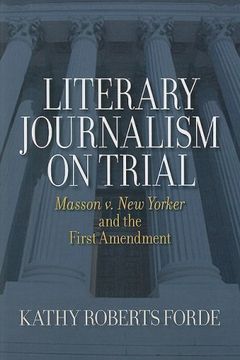Share
Literary Journalism on Trial: Masson v. New Yorker and the First Amendment
Kathy Roberts Forde (Author)
·
Univ Of Massachusetts Pr
· Paperback
Literary Journalism on Trial: Masson v. New Yorker and the First Amendment - Kathy Roberts Forde
Choose the list to add your product or create one New List
✓ Product added successfully to the Wishlist.
Go to My Wishlists
Origin: U.S.A.
(Import costs included in the price)
It will be shipped from our warehouse between
Monday, July 01 and
Friday, July 12.
You will receive it anywhere in United Kingdom between 1 and 3 business days after shipment.
Synopsis "Literary Journalism on Trial: Masson v. New Yorker and the First Amendment"
Winner of the 2009 Frank Luther Mott-Kappa Tau Alpha Book Award and the AEJMC History Division Book Award. In November 1984, Jeffrey Masson filed a libel suit against writer Janet Malcolm and the 'New Yorker', claiming that Malcolm had intentionally misquoted him in a profile she wrote for the magazine about his former career as a Freud scholar and administrator of the Freud archives. Over the next twelve years the case moved up and down the federal judicial ladder, at one point reaching the U.S. Supreme Court, as lawyers and judges wrestled with questions about the representation of truth in journalism and, by extension, the limits of First Amendment protections of free speech. Had a successful Freudian scholar actually called himself an intellectual gigolo and the greatest analyst who ever lived? Or had a respected writer for the 'New Yorker' knowingly placed false, self-damning words in her subject's mouth?'In Literary Journalism on Trial,' Kathy Roberts Forde explores the implications of Masson v. 'New Yorker' in the context of the history of American journalism. She shows how the case represents a watershed moment in a long debate between the advocates of traditional and literary journalism and explains how it reflects a significant intellectual project of the period: the postmodern critique of objectivity, with its insistence on the instability of language and rejection of unitary truth in human affairs. The case, Forde argues, helped widen the perceived divide between ideas of literary and traditional journalism and forced the resolution of these conflicting conceptions of truth in the constitutional arena of libel law. By embracing traditional journalism's emphasis on fact and objectivity and rejecting a broader understanding of truth, the Supreme Court turned away from the First Amendment theory articulated in previous rulings, opting to value less the free, uninhibited interchange of ideas necessary to democracy and more the trustworthiness of public expression. The Court s decision in this case thus had implications that reached beyond the legal realm to the values and norms expressed in the triangular relationship between American democracy, First Amendment principles, and the press.
- 0% (0)
- 0% (0)
- 0% (0)
- 0% (0)
- 0% (0)
All books in our catalog are Original.
The book is written in English.
The binding of this edition is Paperback.
✓ Producto agregado correctamente al carro, Ir a Pagar.

